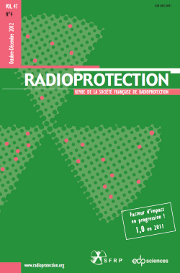No CrossRef data available.
Article contents
Traitement par la thrombopoïétinedu syndrome hématopoïétique induitpar une irradiation létale
Published online by Cambridge University Press: 17 June 2005
Abstract
Treatment with thrombopoietin of the hematopoietic syndrome induced by lethal irradiation.The therapeutical efficacy of thrombopoietin, an haematopoietic cytokine, has been evaluated on improvement of haematopoietic syndrome, haematopoietic recovery and survival in C57BL6J mice following total body irradiation with a 60Co source (7-10 Gy). A single administration of 0.3 μg thrombopoietin 2 h after an irradiation of 9 Gy increased the 30-day survival. The survival enhancement was related to an accelerated haematopoietic recovery for all lineages and a decrease in bacterial infections. However, when the administration was delayed to 24 h after irradiation, thrombopoietin had a lower efficiency on both survival and haematopoietic recovery. We observed that half of the thrombopoietin-treated mice died between the 2nd and the 6th month after irradiation. This long-term mortality was likely to be due to thrombosis formation. In fact, we have demonstrated that thrombopoietin activates platelets which in turn enhance thrombosis formation in irradiated mice. In order to avoid thrombosis, we administered ticlopidine, an antagonist of platelet activation, to mice before irradiation. Almost all of the 9 Gy irradiated mice which received both thrombopoietin and ticlopidine survived up to 6 months, reaching the same efficiency than a bone marrow graft. In summary, we have shown that thrombopoietin treatment enhances survival of lethally irradiated mice in relation with protection from haematopoietic syndrome. Nonetheless, an anti-platelet drug might be associated with thrombopoietin to avoid thrombosis formation which might be lethal on a long-term basis.
- Type
- Research Article
- Information
- Copyright
- © EDP Sciences, 2001


